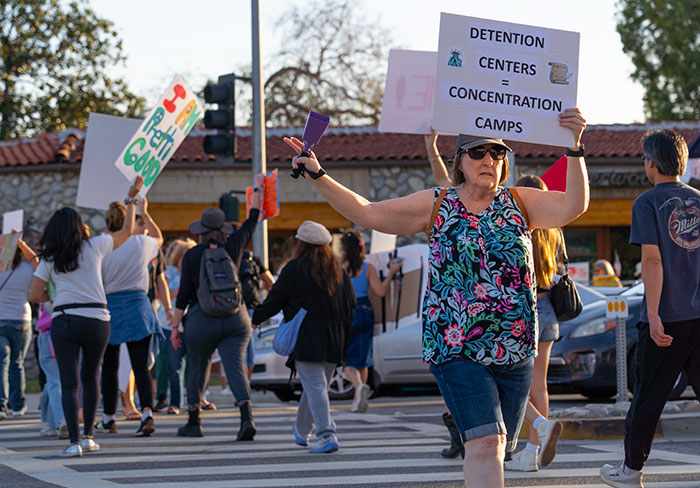Key city issues addressed at busy council meeting
The Claremont City Council approved three important resolutions during a busy Tuesday night council meeting.
The council voted on an agreement with La Verne to manage the water system, had a reversal of an Architectural Commission decision regarding the Serrano II housing project and granted ticket-writing powers to the city arborist.
State Assemblyman Chris Holden was on hand to kick off the meeting with a legislative update, which outlined the bills Mr. Holden has sent to the governor’s desk. These included a bill that lengthens the statute of limitations for victims of human trafficking and another that increases the rights of small business franchisees when dealing with their corporate owners.
“As your representative, it’s my top priority to serve this community and to be responsive to your needs,” Mr. Holden said. “It is indeed my honor to serve Claremont in the state assembly, and I look forward to our continued partnership.”
Two of Tuesday night’s votes were carried over from the last meeting on September 22 after being postponed due to two councilmembers’ absences. The items included approval of plans for the Serrano II housing project and the water deal with La Verne.
Development hits a bump, but moves forward
The Serrano II housing project, a proposed housing tract near the intersection of Base Line and Mountain, took center stage Tuesday as councilmembers and the public worked through their issues with the development.
The project is the sister development of the Serrano I project, which is currently under construction. It had come under fire from members of the city’s Architectural Commission for what the commissioners characterize as flaws and inconsistencies in design. During their meeting on July 15, the commission voted 3-2-2 to deny the Serrano II plans.
City staff recommended reversal of the commission’s decision with a few changes tacked on: revising the second-floor window location so adjacent windows don’t look into each other, replacing the window trim of 10 of the 40 units on the lot and changing the color of one of the houses to better conform with the development’s color palette.
During the meeting, Mayor Corey Calaycay pointed out that the architectural commission members who voted against the Serrano II project were not on the commission when Serrano I was approved in 2013.
Prior to Tuesday’s meeting, the resolution had been delayed twice, once during the September 8 meeting and again during the September 22 meeting.
On September 8 and Tuesday night, emails highlighting alleged violations to the city’s housing element—a state-required document that demonstrates readiness and ability to provide low-income housing—were delivered at the 11th hour to try to persuade the council to vote against Serrano II. The emails, penned by Claremont resident Jacob Patterson, claimed the project violates the city’s existing housing element in regards to the percentage of affordable housing required for each development.
Claremont’s housing element was approved by the planning commission in January 2014. Amid outcry from residents over the rumored development of low-income housing on a 5.9-acre parcel on Mills Avenue, the city council opted to send the housing element back to the commission for further review.
With a February 15, 2014 deadline looming, the council was aware of the penalties, which included the city having to review and resubmit again in four years instead of the eight years afforded to cities that met the deadline.
The housing element does not require cities to actually provide low-income housing, it only says that cities must prove to the state of California that they have the available land to do so. Since that January 2014 meeting, the city and city council have not addressed the Housing Element Update.
City Attorney Sonia Carvalho explained at Tuesday night’s meeting that although there is currently a “lack of a housing element,” it doesn’t mean the city can’t approve development projects.
Councilmember Sam Pedroza, after expressing his dismay at the “piecemeal” development along Baseline, acknowledged the need to update the housing element. The councilmember then criticized Mr. Patterson’s letter, calling it “threatening.”
“Now in the meantime, I say ‘bring it on, sue us already.’ Stop making threats,” Mr. Pedroza said. “Especially with these last-minute emails that, they’re just meant for complete inside baseball.”
The resolution passed 4-1, with Councilmember Opanyi Nasiali casting the only dissenting vote.
Council takes action for water partner
The deal with La Verne is a crucial step toward the city’s ultimate goal of claiming eminent domain over the water system, which is currently owned and operated by the privately-held Golden State Water Company. A Los Angeles County Superior Court judge will review the eminent domain case on March 7, 2016.
Under the deal, Claremont would own the system and cover billing and other expenses, while La Verne would provide staffing and general maintenance. Under the agreement, La Verne will be paid 10 percent of the $1.5 million allocated toward the water system, should Claremont win the eminent domain claim.
During public comment on the resolution, Claremont resident Douglas Lyons expressed skepticism over certain parts of the La Verne deal, including a passage that gives Claremont the job of maintaining service vehicles.
“Why will Claremont be responsible for the acquisition, maintenance, repair and replacement of vehicles and equipment used to operate and maintain the water system?” Mr. Lyons said. “As an experienced operator, would not La Verne be able to accomplish these functions in a more timely and efficient manner?”
The council passed the resolution with a unanimous 5-0 decision. La Verne passed its side of the agreement during its city council session on September 21.
City arborist can issue tree fines
The third resolution on the agenda dealt with giving the city arborist the power to issue tickets and fines to Claremont property owners who are not properly maintaining city-owned trees.
Under the new resolution, Claremonters who are in violation will first be subject to a visit from city volunteers, followed by a Notice of Violation and, if the person is still not taking care of the trees, a fine ranging from $100 to $500 per day for as long as the person is in violation.
The resolution passed by a vote of 4-1, with Mr. Nasiali the only dissenting vote.
Emotions run high
Measure PS, a measure that allocates $50 million toward building a new police station, was a hot topic during the public comments session. Two Claremonters, Sayeed Shaikh and Frank Bedoya, offered impassioned speeches on the need for a new police station in the city.
Mr. Shaikh, who serves on the city’s police commission, claimed the current station is, “pretty much on the verge of being dilapidated,” and urged the passage of the measure.
Mr. Bedoya also encouraged Claremonters to pass the measure. “The time is now, the need is great,” he said.
A woman, who did not give her name, fired off a rebuttal to the proposed measure, calling it “tyrannical” and “stupid” and quoting numerous bible verses until her time ran out.
The public comments elicited a strong reaction form the council, with Mr. Pedroza offering up an idea to create an ad hoc committee dedicated to informing the public about Measure PS in the weeks before the election.
Councilmember Larry Schroeder also offered his two cents on the steep cost of the proposed public safety facility.
“I can sit here and say the police station costs about half of that $50 million and not include furnishings and radios and LEED certifications and engineering and all the other costs,” Mr. Schroeder said. “But we’re putting out there what the top cost would be and we’re putting everything out there.”
“We’re doing the best we can to make sure everyone has the information they need to have an educated vote,” Mayor Calaycay said. “But nothing was done outside of the process. It was very transparent, very open. It did provide for people to provide feedback.”
Mayor Calaycay added that the parcel tax, which has generated much of the controversy, was voted on by the people of Claremont as the best way to finance the police station.
The council meets again on October 27.
—Matthew Bramlett
news@claremont-courier.com










0 Comments